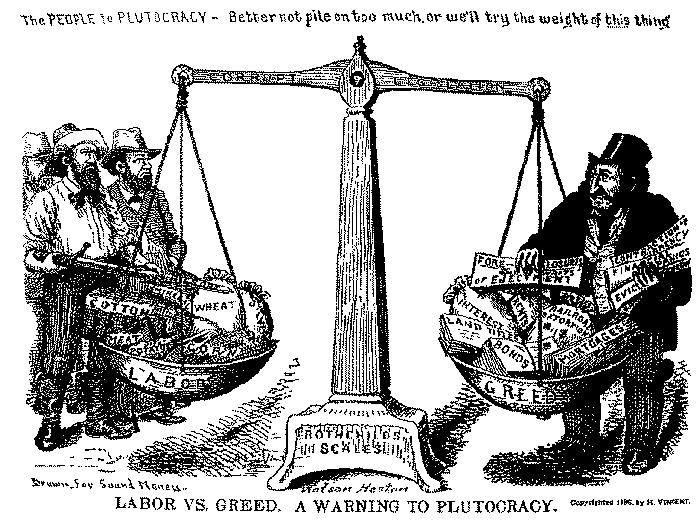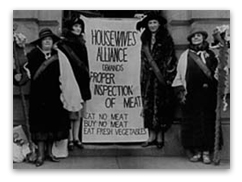History 2710 MacKay
Readings:
- Zinn: 11, 13
- Reforming the World: Women in the Progressive Era
- The 4 Progressive Amendments to the Constitution
Discussion Forum:
Create a persona for yourself --either a laborer or a farmer. What is the nature of your work? What is your relation to corporate America? What tactics are you using to make business more responsible for the adverse effects on you? Are you joining a union? or the Farmers' Alliance? Cite sources.
We will consider three groups of Americans trying to reform corporate capitalism, politics, quality of life in cities, social justice. We will consider their efforts to expand democracy and the efforts to regulate capitalism.

Labor vs. Greed, Southern Mercury (Dallas, TX), July 23, 1896 .Plutocracy was a synonym for monopolist in the late nineteenth century. In Greek Mythology, Pluto was the god of the lower world, also known as Hades. Populist newspapers frequently reprinted particularly good cartoons from other Populist newspapers. Watson Heston of Carthage, Missouri, drew this illustration for Jacob Coxey's newspaper, Sound Money (Massillon, Ohio). Henry Vincent, former editor of the American Nonconformist, which carried many Watson Heston cartoons, worked for Coxey in 1896, and copyrighted the illustration, which the Southern Mercury of Dallas, Texas, reproduced. Notice that the balance bar at the top of the scales is labeled "Corrupt Legislation." Populist contended that it was corrupt legislation that allowed exploiters to steal from producers. Also, note that the sword in the farmer's hand is labeled the "last resort." Although farmers expressed considerable anger toward banks and mortgage companies, very little actual violence occurred. The People's Party was firmly committed to the democratic process. ( http://history.smsu.edu/wrmiller/Populism/texts/How_To_Use.htm)
Little Giant" thresher, like other farm
machinery, reduces farm labor needs, but increases capital costs
.
Copyright 1997 State Historical Society of Wisconsin
Beginning in the 1870s, worsening conditions in rural America caused many people to abandon their farms. At the same time, changes in farming practices and the agricultural marketplace made farmers more dependent on commercial decisions made by big-city businessmen. In reaction to these trends, farmers began to take political action--first with the Grange Movement, then the Farmers' Alliance and finally the emergence of the national Populist movement in the 1890s.
The populist movement was the most important and
radical third party ever established in this country. It was the last
substantial effort at structural alteration of hierarchical economic forms in
modern America. It was, in fact, America's greatest mass-democratic movement.
In-class discussion:
Topic #3: Research how a piece of
progressive legislation
works nowadays. You may start with Wikipedia, but also use .gov and/or .edu
domains in your research. Cite your sources.
 The Progressive Era is a label applied to rather broad and sometime
disparate attempts in the period from the 1900 through the end of World
War I in 1918 to address economic and social reform. The movement
included advocates in both the Democratic and Republican parties, as
well as members of third parties focused on specific issues. The
Progressive name derived from forward-thinking or "progressive" goals
The Progressive Era is a label applied to rather broad and sometime
disparate attempts in the period from the 1900 through the end of World
War I in 1918 to address economic and social reform. The movement
included advocates in both the Democratic and Republican parties, as
well as members of third parties focused on specific issues. The
Progressive name derived from forward-thinking or "progressive" goals
